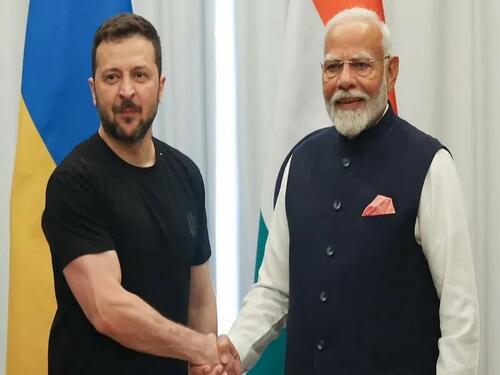Will India Supplant China As The Leader Of The Incipient Non-Western Peace Process On Ukraine?
Authored by Andrew Korybko via substack,
India’s WION cited unnamed diplomatic sources to report on Friday that Prime Minister Modi is planning to visit Kiev at the end of August. This was surprising considering that India summoned the Ukrainian Ambassador in mid-July to complain about Zelensky publicly insulting Modi after the latter visited Russia. It was analyzed here that Ukraine risked losing the support of the Global South after attacking the leader of its most populous country, but then something major happened to change Delhi’s calculations.
Ukrainian Foreign Minister Kuleba visited Beijing, which this preview here foresaw as a signal that his country is semi-serious about resuming peace talks with Russia. That insight was proven correct after he said that his country is ready for this but added that it won’t be forced into anything either. Russian Foreign Ministry spokeswoman Zakharova was skeptical, but Kremlin spokesman Peskov was less so, instead pointing to the political and legal obstacles that would have to be resolved before this happens.
In any case, the world interpreted Kuleba’s words as a newfound willingness to entertain the resumption of peace talks with Russia, which was hitherto taboo for his side and its foreign supporters to talk about. From India’s perspective, the possibility of China organizing a Brazilian-fronted non-Western peace process before and/or during the G20- in Rio would be a nightmare come true since it would result in Russia becoming diplomatically indebted in China, which could eventually lead to trouble for India.
Russia’s recently recalibrated Asian balancing act, which readers can learn more about here and here, was crowned by Modi’s visit to Moscow but now India has reason to worry that all this progress might be reversed if China calls in its diplomatic debt and gets Russia to distance itself somewhat from India. It’s no secret that China and India are embroiled in a fierce border dispute, so it’s not unforeseeable that Beijing might lean on Moscow to decelerate and ultimately cut off the supply of military spares to Delhi.
India is disproportionately dependent on Russian equipment so that scenario could instantly cripple its deterrence capabilities vis-à-vis China and thus force it into accepted a lopsided deal for resolving their dispute under the pain of war if it refuses. To be absolutely clear, there aren’t any credible indications that Russia would bend to China’s speculative demand to jointly blackmail India via complementary military means, but it can’t confidently be ruled out by responsible Indian policymakers either.
That being the case, it naturally follows that the most effective way to preemptively thwart this worst-case scenario is for India to make a play for replacing China as the leader of the incipient non-Western peace process on Ukraine, ergo the reason why Modi might soon visit Kiev. From Russia’s perspective, it would be more ideal for India to mediate a resolution to this conflict than for China to do so since its established balancing/pragmatic policymaking faction wants to avoid diplomatic indebtedness to Beijing.
Likewise, the US would also prefer for India to play this role instead of China since the latter is its systemic rival in the New Cold War, hence why Washington is unlikely to let Kiev participate in any Chinese-organized but Brazilian-fronted non-Western peace process anyhow. Nevertheless, Kiev might also “go rogue” to an extent by still taking part in such events, which its leadership might envisage leveraging to get more aid from the US and have it rescind all existing restrictions on the use of its arms.
Even if that happens, Ukraine would be unable to agree to anything meaningful without the US’ approval though seeing as how it militarily depends on American-led NATO, so there are limits to what could come from its participation in such Chinese-organized but Brazilian-fronted events. By contrast, the US would have no objections to Ukraine taking part in Indian-led ones, especially since this could serve to help the US and India “reset” their troubled ties by cooperating to end this globally significant conflict.
In the same vein, Ukraine and India could also “reset” their ties too, which unexpectedly worsened after Zelensky insulted Modi. If his country is truly serious about resuming peace talks with Russia and has American approval for this, then India could promptly mediate between them given its special and privileged strategic partnership with Russia. It would be a win-win for India, the US, Ukraine, and Russia if Modi assumes this role, but a lost diplomatic opportunity for China, which won’t give up its plans easy.
Tyler Durden
Sat, 07/27/2024 – 23:20
via ZeroHedge News https://ift.tt/aglAGyt Tyler Durden
